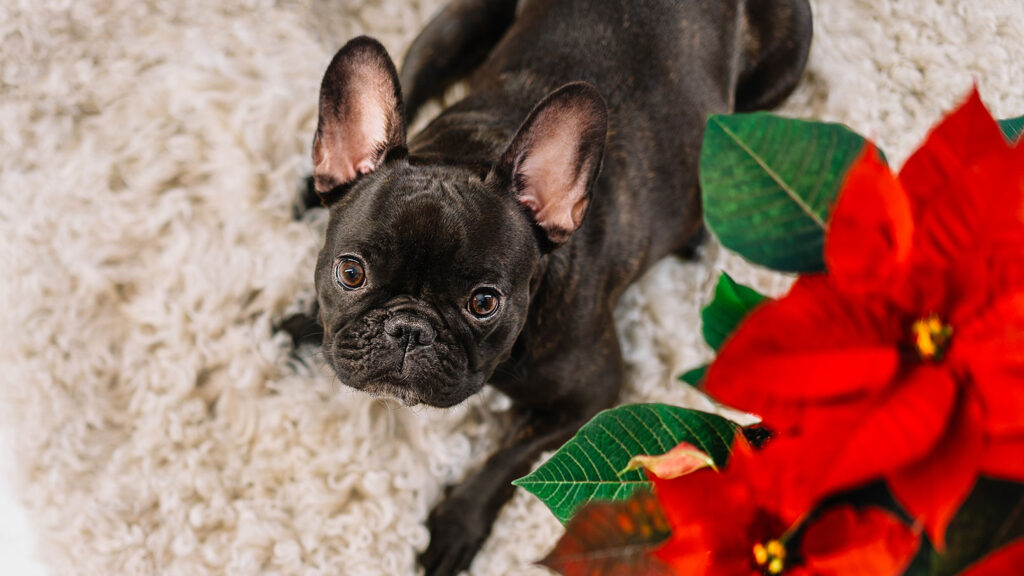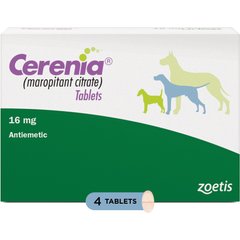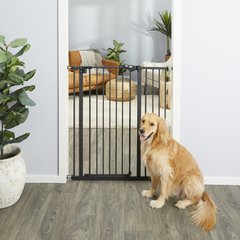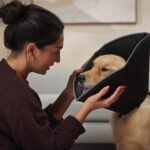Are Poinsettias Poisonous to Dogs?

Photo by Adriana Duduleanu/iStock/Getty Images Plus
The poinsettia, also known as the Christmas flower, is a vibrant, festive plant that’s often given as a gift during the holiday season. But are poinsettias poisonous to dogs?
Despite the common misconception that poinsettias can cause serious or fatal symptoms in dogs, they’re relatively low in toxicity. Ingestion may result in mild digestive upset or drooling.
We talked with veterinarians to learn more about the risks of poinsettias to dogs, what to do if your dog eats the plant, and other poisonous holiday plants to avoid.
Key Takeaways
- Poinsettias are only mildly toxic to dogs and usually cause minor gastrointestinal symptoms if ingested.
- Ingesting a small amount of the plant may result in drooling, vomiting, or diarrhea—but rarely requires medical treatment.
- Pet parents should monitor their dog closely and consult a vet if symptoms persist or are severe.
- Prevent exposure by keeping poinsettias out of reach and considering pet-safe plant alternatives.
Are Poinsettias Poisonous to Dogs?
Technically, yes, poinsettias are poisonous to dogs. However, they don’t pose major risks if ingested.
“While poinsettias have a reputation as a toxic plant, they are actually only mildly toxic to dogs,” says Veronica Villanueva, DVM, veterinarian and medical director at VEG Emergency Vet in Anaheim Hills, California. “They mostly cause irritation of the mouth and gastrointestinal tract, which can lead to drooling, vomiting, and sometimes diarrhea,” Villanueva says. “Rarely does ingestion of this plant cause serious illness.”
The sap of the poinsettia plant is the most concerning part, says Renee Schmid, DVM, DABT, DABVT, senior veterinary toxicologist and DVM supervisor at Pet Poison Helpline in Bloomington, Minnesota. The poinsettia’s milky sap contains saponins, which are naturally occurring chemicals found in plants that can cause gastrointestinal (GI) distress.
The severity of the toxicity is generally mild, with mild stomach upset and lack of appetite that resolves without the need for medical attention, Dr. Schmid says. However, if signs of GI distress are persistent, this could lead to dehydration and the need for veterinary care.
“Ingesting part of a poinsettia is rarely cause for concern unless vomiting, diarrhea, or lack of appetite are persistent,” she adds.
Symptoms of Poinsettia Poisoning in Dogs
According to Dr. Schmid, common symptoms of poinsettia poisoning in dogs include:
- Drooling
- Lack of appetite
- Vomiting
- Diarrhea
Rare complications that may arise when dogs ingest poinsettias are dehydration due to continued vomiting or diarrhea, as well as skin irritation from exposure to the plant.
What to Do If Your Dog Eats a Poinsettia
Sabrina Kong, DVM, a Tracy, California-based veterinary consultant for We Love Doodles, shares these steps for what to do if your pup happens to come across a poinsettia and eat it:
- Gently remove any remaining plant pieces from their mouth.
- Offer them a small drink of water to help soothe any irritation.
- Confine your canine companion to a safe, quiet space and carefully watch for signs like excessive drooling, constant lip-licking, or vomiting.
“For just tiny nibbles, you can often watch for very mild, brief symptoms like a bit of drooling,” she says. “However, it’s always best to err on the side of caution and call for professional guidance, especially if you have a puppy or an older dog, as they can be more sensitive.”
The following numbers can be helpful in case of an emergency:
- Pet Poison Helpline: 855-764-7661; a consultation fee applies
- ASPCA Animal Poison Control Center: 888-426-4435; a consultation fee may apply
According to our experts, you should contact a veterinarian or pet poison helpline immediately if:
- Your dog has eaten a significantly large amount of a poinsettia
- They’re showing persistent vomiting or diarrhea that lasts more than two hours
- You notice signs, such as vomiting more than once after eating the plant; blood in their vomit; bloody or black diarrhea; loss of appetite; or lethargy
It’s crucial to never induce vomiting yourself, as this may worsen inflammation or lead to other complications in their throat, Dr. Kong says.
At home, you can try withholding food for four to six hours, then gradually offer small amounts of boiled chicken and rice, she recommends. If symptoms continue beyond 12 hours, reach out to your vet.
“Typically, a poinsettia ingestion doesn’t warrant extensive veterinary treatment; in about 90% of cases, they cause only mild, self-limiting gastrointestinal upset,” Dr. Kong says. “If your dog’s symptoms are more severe, your vet might provide anti-nausea medication, like Cerenia.”
Recommended Product
Your vet may also recommend a bland diet. Hospitalization is rare unless the dog becomes significantly dehydrated.
How To Keep Your Dog Away From Poinsettias
To prevent exposure to poinsettias, try these expert-recommended tips to protect your pooch:
- Place plants on high shelves. Even if a dog can’t jump like a cat, they can still be resourceful, Dr. Kong says. Place your poinsettia up high so it’s out of your pet’s reach.
- Use pet gates to block access to areas where plants are kept. Gates are helpful in creating boundaries and keeping your dog safe from potentially unsafe items or materials like poinsettias.
Recommended Products
- Consider safer alternatives. There are plenty of festive, dog-friendly alternatives to poinsettias. You can swap them out for realistic faux versions, or opt for safer live plants like Christmas cacti, Dr. Kong says.
- Be vigilant. Never leave fallen leaves or plant pieces where curious noses can find them.
“The bottom line is, while poinsettias are relatively low-risk, prevention is the best way to ensure a stress-free holiday season for you and your pet,” Dr. Kong says.
Other Poisonous Holiday Plants for Dogs
If you’re looking to spruce up your home with plants for the holidays, it’s important to stay away from certain types that can pose serious risks to your pup.
Other common holiday plants that aren’t safe for dogs include:
- Holly: The berries and leaves contain saponins, which can upset your dog’s stomach. If they munch on it, you might see symptoms like vomiting, diarrhea, drooling, and unusual head shaking.
- Mistletoe: Eating it can lead to stomach issues, drooling, and diarrhea. If a dog consumes a large amount, it can cause more serious problems like low blood pressure, trouble breathing, seizures, and, in rare cases, even death.
- Lilies: Some lily varieties may only cause mild stomach upset, but others, like the Easter lily or daylily, are dangerous. They can lead to kidney failure in cats, and while dogs are less affected, it’s best to keep all lilies out of your home if you have pets.
- Amaryllis flower: Every part of this plant, especially the bulb, can cause issues for dogs. If ingested, it can cause vomiting, diarrhea, lethargy, a decreased appetite, tremors, and even a drop in blood pressure.
- Ivy (English Ivy): Ingesting ivy can cause vomiting, diarrhea, and drooling. Ivy can also irritate the skin.
- Christmas Tree (pine needles and water): The tree itself isn’t toxic, but the sharp pine needles can irritate your dog’s mouth and stomach if they chew on them. And don’t forget about the water in the tree stand: It can contain bacteria and chemicals from tree preservatives that could be harmful or toxic if your dog drinks it.






